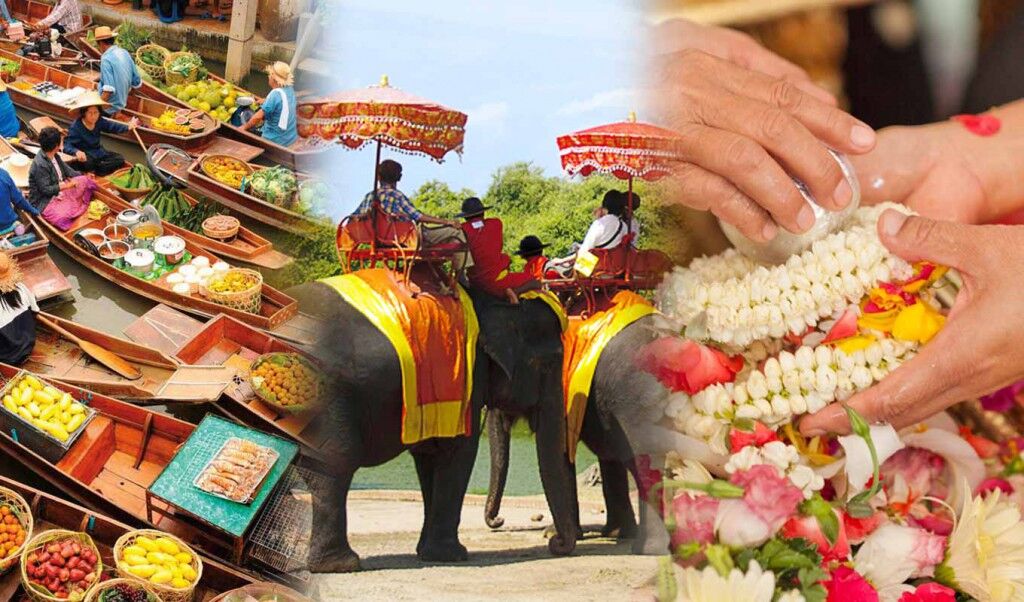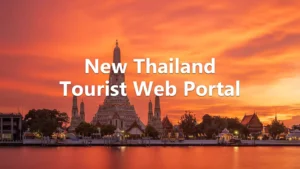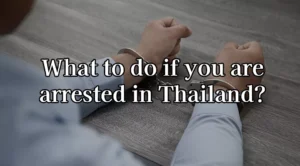With its vibrant culture, stunning landscapes, and welcoming communities, it’s no surprise that Thailand appeals to expats and long-term visitors alike. However, settling down in Thailand requires careful planning, from securing the right visa to setting up essential services and finding the perfect place to live.
In this article, we will walk you through everything you need to know to make your dream of staying long-term in Thailand possible, as we cover the different visas that best suit your needs and the basic everyday essentials that will make your living experience in the country more enjoyable.
Getting the Right Visa to Stay Long-Term in Thailand
The first step to ensuring your long-term stay in Thailand is applying for the right Thai visa that best suits your needs and purpose in the country. Fortunately, Thailand offers several visa options to pick from:
- Long-Term Resident Visa (LTR Visa): The LTR Visa Thailand was designed for retirees, professionals, and digital nomads who are looking for stability in Thailand. With a validity of up to 10 years, the LTR Visa includes perks like reduced tax rates, access to fast-track immigration services, and easier work permits for certain categories.
- Thailand Elite Visa: The Thailand Elite Visa is a type of long-term tourist visa that offers an incredibly convenient and rewarding way to settle down in the Kingdom. Available through a variety of membership packages, it provides stays ranging from 5 to 20 years, making it an attractive choice for those seeking extended residency. Holders of the Thailand Elite Visa are also able to enjoy a wide array of exclusive benefits including free spa treatments, wellness services, special gifts and discounts, and priority immigration processing at airports, just to name a few.
- Destination Thailand Visa: The Destination Thailand Visa (DTV Visa Thailand), often referred to informally as the “digital nomad visa,” was designed for remote workers and freelancers who can work from anywhere. It allows a 5-year residency in Thailand with multiple entries, and permits stays of up to 180 days per entry, with the option to extend.
- Thailand Retirement Visa: The Thailand Retirement Visa, officially known as the Non-Immigrant OA Visa, is a popular option among expats planning to retire in Thailand. However, to qualify, applicants must be at least 50 years old and fulfill several additional requirements such as proof of financial security and health insurance.
- Thailand Marriage Visa: The Thailand Marriage Visa is a long-term visa designed for foreigners who are legally married to a Thai national and wish to live and work in Thailand.
- Thailand Business Visa: The Thailand Business Visa, officially referred to as the Non-Immigrant B Visa, is designed for foreigners looking to start a business of their own or seek employment in Thailand.
Where to Stay in Thailand
Choosing your living arrangement in Thailand greatly depends on your budget, lifestyle, and how long you plan to stay in the country. Options include temporary accommodations or long-term investments in property.
- Serviced Apartments: Thailand’s many luxury hotel brands also offer serviced apartments, especially in cities like Bangkok and Phuket. These provide the convenience of premium amenities including housekeeping, gyms, and pools, with a more residential setting making them ideal for those who prefer a hassle-free experience.
- Airbnb: Airbnb is a popular option in Thailand due to its flexibility and diverse range of accommodations. You can choose from budget-friendly studios in bustling city centers or spacious villas on serene beachfronts. Many Airbnbs in Thailand also offer features like high-speed internet, fully equipped kitchens, and long-term stay discounts, which make them an ideal choice for those staying in Thailand for extended periods.
- Buying a Home or Condo in Thailand: Foreigners can buy property in Thailand. In the case of buying condominiums, foreigners can buy one and legally own it under their name, but they can only own up to 49% of the total area while the remaining 51% must be owned by Thai nationals. For other forms of property such as land and houses, foreigners can enter a 30-year long-term lease agreement which is both renewable and is the closest way for them to gain de facto control of the property.
Staying Long-Term in Thailand: The Essentials
Living comfortably long-term in Thailand involves organizing and managing certain necessities. These include the following:
- Opening a Bank Account: Opening a bank account in Thailand is highly beneficial for handling daily expenses, avoiding international transaction fees, and complying with visa requirements such as the Thailand Retirement Visa and Thailand Marriage Visa. Local banks also offer mobile apps that simplify tasks like bill payments and fund transfers, so you won’t need to have cash on you when making a purchase, whether on the streets or in a mall.
- Smartphones and Data Plans: Thailand has excellent mobile network providers such as AIS, DTAC, and TrueMove. You can purchase prepaid or postpaid plans with affordable rates. SIM cards are easy to find, and coverage is reliable nationwide. You can even get a new SIM card as soon as you get off the plane at the airport.
- Health Insurance: Health insurance in Thailand is considerably more affordable compared to the West and having it is vital for covering medical costs and meeting visa requirements. It is important to look out for plans that include outpatient visits, emergency care, and hospitalization, as health insurance can protect you from any unexpected challenges and grant you peace of mind during your stay in the country.
Where to Go and What to Do in Thailand
Thailand offers endless possibilities for exploration, as it offers experiences in bustling cities, the tranquil countryside, and idyllic islands. Below is a simple overview of the things you can do in Thailand.
Bangkok
The capital city is a hub for culture, shopping, and entertainment. Explore iconic landmarks like the Grand Palace and Wat Arun, shop at Chatuchak Market, and enjoy rooftop dining with panoramic city views. Here are a few things you can do in Bangkok:
- Temples and Landmarks: Visit the Grand Palace, Wat Pho, and Wat Arun to experience Thailand’s cultural heritage.
- Shopping: Explore Chatuchak Market, MBK Center, and Siam Paragon for a mix of street bargains and luxury brands.
- Cultural Experiences: Discover Thai art and history at the Bangkok National Museum or the Jim Thompson House.
- Rooftop Bars and Nightlife: Enjoy panoramic views at bars like Vertigo or Sky Bar, and experience the vibrant nightlife at Khao San Road.
Phuket
Phuket is the ultimate beach destination. Its stunning coastline, vibrant nightlife, and luxury resorts make it a favorite among expats and tourists alike. Here are a few things you can do in Phuket:
- Beach Days: Relax at Patong, Kata, or Nai Han beaches.
- Island Hopping: Explore nearby islands like Phi Phi and Similan, known for their crystal-clear waters and diving spots.
- Historic Phuket Town: Wander through its colorful streets, featuring Sino-Portuguese architecture and artisanal shops.
- Water Sports: Try scuba diving, snorkeling, or paddleboarding along the coast.
Chiang Mai and Northern Thailand
Known for its relaxed vibe and cultural heritage, Chiang Mai is a haven for those seeking a quieter pace of life. The region is rich in history, with ancient temples and beautiful mountain scenery. Here are a few things you can do in Chiang Mai and Northern Thailand:
- Temples and Markets: Visit Doi Suthep Temple and shop at the bustling Night Bazaar.
- Outdoor Activities: Trek through the hills, visit Doi Inthanon National Park, or experience ziplining.
- Art and Workshops: Take part in traditional Thai cooking classes or learn local crafts like pottery or silk weaving.
Southern Thailand
Southern Thailand offers tropical paradise vibes, from Krabi’s dramatic limestone cliffs to Koh Samui’s luxurious retreats. It’s the perfect destination for water sports, hiking, or simply unwinding by the beach. Here are a few things you can do in Southern Thailand:
- Krabi: Discover Railay Beach and explore the Emerald Pool and hot springs.
- Koh Samui: Relax at luxury resorts or take a boat tour to Ang Thong National Marine Park.
- Koh Tao: A top destination for diving enthusiasts with vibrant coral reefs and marine life.
- Khao Sok National Park: Perfect for hiking, wildlife spotting, and enjoying scenic lakes surrounded by limestone cliffs.
Professional Assistance in Settling Down in Thailand
If you are looking to settle down long-term in Thailand and want to simplify the entire process, get in touch with Siam Legal International. We are a full-service law firm and visa consultancy with over 20 years of experience in helping clients from all around the world resolve their immigration and legal needs in Thailand. Our services include:
- Thai visa services
- Bank account opening services
- Contract review and assistance with buying property in Thailand
- Legalization and notarization services
For a smooth and stress-free transition to the start of your new life here in Thailand, do not hesitate to contact Siam Legal now to book a consultation!
Living in Thailand FAQ
Can foreigners get legally married in Thailand?
Yes, foreigners can legally marry in Thailand. However, you will both need to get an Affirmation of Marital Status from your respective embassies and have them translated and notarized into the Thai language before you can use them for marriage registration in Thailand.
Can I open a business in Thailand as a foreigner?
Yes, foreigners can open a business in Thailand, but it often requires a Thai partner and compliance with local laws. Incentives are also available to increase your profitability, but you’ll need legal help to navigate all the requirements.
What if I stay in Thailand past my visa?
Overstaying a visa in Thailand is illegal and can lead to fines, deportation, or even being banned from re-entering Thailand. Because of this, it is important that you pay careful attention to the expiry date of your visa.
Can I own land in Thailand?
Foreigners cannot own land outright in Thailand, but you can still enter a renewable 30-year lease agreement, which will give you the closest experience to having de facto control over the land.
Is healthcare expensive in Thailand?
Thailand offers reasonably priced healthcare for outpatient treatments and minor ailments. However, hospitalization expenses can be higher, particularly in private hospitals, which feature modern amenities and English-speaking medical staff. Public hospitals are a more affordable option but may involve longer waiting times, limited facilities, and challenges in communication due to language differences.









































